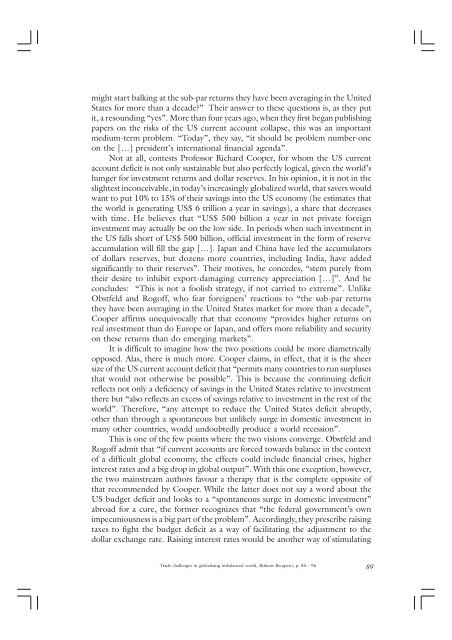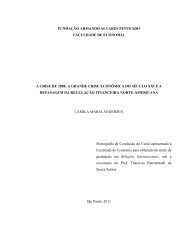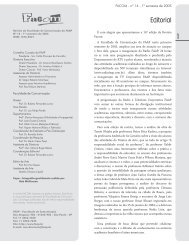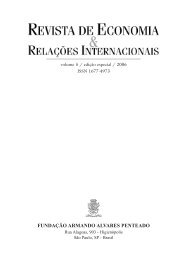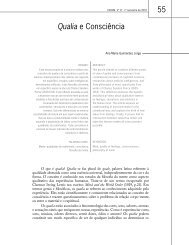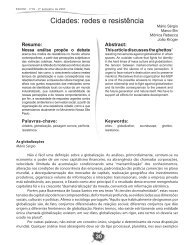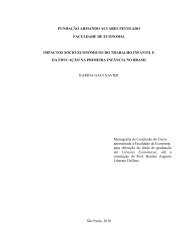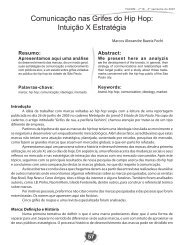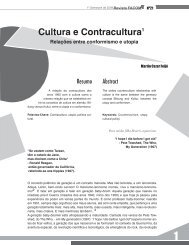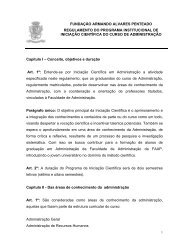Número 8 - Janeiro 2006 - Faap
Número 8 - Janeiro 2006 - Faap
Número 8 - Janeiro 2006 - Faap
Create successful ePaper yourself
Turn your PDF publications into a flip-book with our unique Google optimized e-Paper software.
might start balking at the sub-par returns they have been averaging in the United<br />
States for more than a decade?” Their answer to these questions is, as they put<br />
it, a resounding “yes”. More than four years ago, when they first began publishing<br />
papers on the risks of the US current account collapse, this was an important<br />
medium-term problem. “Today”, they say, “it should be problem number-one<br />
on the […] president’s international financial agenda”.<br />
Not at all, contests Professor Richard Cooper, for whom the US current<br />
account deficit is not only sustainable but also perfectly logical, given the world’s<br />
hunger for investment returns and dollar reserves. In his opinion, it is not in the<br />
slightest inconceivable, in today’s increasingly globalized world, that savers would<br />
want to put 10% to 15% of their savings into the US economy (he estimates that<br />
the world is generating US$ 6 trillion a year in savings), a share that decreases<br />
with time. He believes that “US$ 500 billion a year in net private foreign<br />
investment may actually be on the low side. In periods when such investment in<br />
the US falls short of US$ 500 billion, official investment in the form of reserve<br />
accumulation will fill the gap […]. Japan and China have led the accumulators<br />
of dollars reserves, but dozens more countries, including India, have added<br />
significantly to their reserves”. Their motives, he concedes, “stem purely from<br />
their desire to inhibit export-damaging currency appreciation […]”. And he<br />
concludes: “This is not a foolish strategy, if not carried to extreme”. Unlike<br />
Obstfeld and Rogoff, who fear foreigners’ reactions to “the sub-par returns<br />
they have been averaging in the United States market for more than a decade”,<br />
Cooper affirms unequivocally that that economy “provides higher returns on<br />
real investment than do Europe or Japan, and offers more reliability and security<br />
on these returns than do emerging markets”.<br />
It is difficult to imagine how the two positions could be more diametrically<br />
opposed. Alas, there is much more. Cooper claims, in effect, that it is the sheer<br />
size of the US current account deficit that “permits many countries to run surpluses<br />
that would not otherwise be possible”. This is because the continuing deficit<br />
reflects not only a deficiency of savings in the United States relative to investment<br />
there but “also reflects an excess of savings relative to investment in the rest of the<br />
world”. Therefore, “any attempt to reduce the United States deficit abruptly,<br />
other than through a spontaneous but unlikely surge in domestic investment in<br />
many other countries, would undoubtedly produce a world recession”.<br />
This is one of the few points where the two visions converge. Obstfeld and<br />
Rogoff admit that “if current accounts are forced towards balance in the context<br />
of a difficult global economy, the effects could include financial crises, higher<br />
interest rates and a big drop in global output”. With this one exception, however,<br />
the two mainstream authors favour a therapy that is the complete opposite of<br />
that recommended by Cooper. While the latter does not say a word about the<br />
US budget deficit and looks to a “spontaneous surge in domestic investment”<br />
abroad for a cure, the former recognizes that “the federal government’s own<br />
impecuniousness is a big part of the problem”. Accordingly, they prescribe raising<br />
taxes to fight the budget deficit as a way of facilitating the adjustment to the<br />
dollar exchange rate. Raising interest rates would be another way of stimulating<br />
Trade challenges in globalizing imbalanced world, Rubens Ricupero, p. 84 - 96<br />
89


